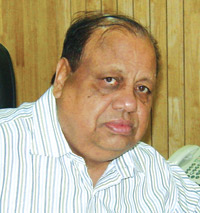
 Maulana Azad Medical College offers MBBS, post graduate degrees of MS, MD and superspeciality degrees of MCh and DM.
Maulana Azad Medical College offers MBBS, post graduate degrees of MS, MD and superspeciality degrees of MCh and DM.
Dr Arun Kumar Agarwal, Dean, Maulana Azad Medical College in an interaction with Dhirendra Pratap Singh and Shally Makin, shared his perspective on medical education in India. Excerpts:

What is the present medical education scenario in India?
India is very rich in terms of clinical material. For the optimal utilization of this richness in medical field, it should be merged with IT and dedicated teaching. Indian medical colleges are at par with international medical colleges. However, our systems needs improvement.
As for as undergraduate education is concerned, we have more than 315 medical colleges in India including both government and private. Our undergraduate and post graduate programmes are fairly acceptable. This strength is because of our good clinical exposure, training schedule and curriculum. Unfortunate suffering of human beings in India, being becomes a fortunate story of medical education in India.
What are the loopholes in the medical education system in India? How can they be removed?

Medical science is progressing so fast that everyday newer diagnostics equipments and tests are being introduced. The challenge is that cost and availability of infrastructure in metro/town as compared to periphery differ. So, the exposures of the students also differ. The theoretical exposure is common, but the practical exposure of the advanced technology is different.
India can absorb one lakh doctors per year, but we only produce 30,000. What should be done to combat this challenge?
We can’t meet this challenge overnight. In the government sector, we have 185 colleges. Are we optimally utilising all those colleges? Every government college has enough clinical material but they have to meet adequate infrastructure and faculty. I am not in favour of mushrooming of medical colleges. Optimal utilisation of medical colleges is very important.
Why are we not able to retain talent?
Going abroad is individuals’ mindset and family decision. Another is non availability of satisfactory placement. Our responsibility is to give medical graduates better opportunities within India. We have to increase the number of post graduate seats. And MCI has also relaxed norms in this direction. Now, couple of thousands seats have increased.
You have been associated with national board of examinations? Please share with us its role.
National board of examinations is a wonderful organisation. It is a parent stream for post graduate education. This idea is based on improving the quality of medical education by elevating the level and establishing standards of post graduate examinations in modern medicine on an all India basis.
You are an ENT specialist. Please brief us your some initiatives in this field?
In ENT, the student should have some required practical skills. The practical skills have to be developed. Now, we are emphasising more on practical exposure.
What is the role of ICT in medical education?
Before we go on an actual patient, we should go on e-learning module of the system. e-Learning is very important for imparting practical education. Now, ICT based virtual classes are playing a big role in medical education.
What needs to be done with medical education to bridge the rural-urban healthcare divide?
Our doctors are ready to go in rural areas provided we give them basic comfort, neat and clean surroundings and safety. There must be basic facility for doctors in rural areas to treat the patients.
Be a part of Elets Collaborative Initiatives. Join Us for Upcoming Events and explore business opportunities. Like us on Facebook , connect with us on LinkedIn and follow us on Twitter , Instagram.












